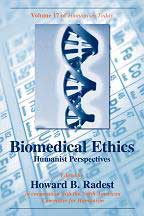 HUMANISM TODAY: VOLUME 17, 2006
HUMANISM TODAY: VOLUME 17, 2006
Biomedical Ethics
Published by Prometheus Press. It is available from in hardcover from the publisher.
Introduction: Humanism and the New Biology
Howard B. Radest
SCIENTIFIC PERSPECTIVES ON BIOETHICS
Twenty-first Century Bioethical Problems
Philip Regal
Bioscience and the Recovery of Nerve
David Schafer
Bioethics of the Germline
Andreas S. Rosenberg
The Moral Status of the Human Embryo
Berit Brogaard
Exploring the Boundaries Between the Scientific and the Spiritual
Harvey Sarles
EXCURSIONS INTO HISTORY
Humanitas and the Human Genome
Faith Lagay
Joseph Fletcher Revisited
Mason Olds
Eugenics and Biotechnology
Stephen P. Weldon
PUTTING BIOETHICS TO WORK
Biology as a Window Into Therapy
Michael Werner
Bioethics, Contraception, and Business
Vern L. Bullough
Bioethics and Justice
Carmela Epright
Rationing is Not a Four Letter Word
Howard B. Radest
Poverty, Health, and Bioethics
Robert B. Tapp
ADDENDUM
Before and After Schiavo
Carmela Epright
Prescription Drugs, Medicare Part D
Kristy Maher
 Biomedical ethics raises a host of humanistic issues. Among these are human dignity, personal autonomy, quality of life, and access to care for all. Now, more than ever, scientific discoveries and medical technologies prompt us to rethink older perspectives. Humanists have an unprecedented opportunity to shape the moral agenda of the future.
Biomedical ethics raises a host of humanistic issues. Among these are human dignity, personal autonomy, quality of life, and access to care for all. Now, more than ever, scientific discoveries and medical technologies prompt us to rethink older perspectives. Humanists have an unprecedented opportunity to shape the moral agenda of the future.
In this collection of thoughtful articles from the Humanist Institute, humanist scholars from various fields explore a number of critical issues in bioethics. The moral status of the human embryo, scientific medicine versus Eastern concepts of caregiving, the human genome project, eugenics, contraception, and the economics of healthcare are just some of the topics considered in this enlightening volume.
The contributors include: Berit Brogaard, Vern Bullough, Carmela Epright, Faith Lagay, Kristy Maher, Mason Olds, Howard B. Radest, Philip Regal, Andreas S. Rosenberg, Harvey Sarles, David Schafer, Robert B. Tapp, Stephen P. Weldon, and Michael Werner.
For students of ethics, healthcare practitioners and policy makers, and everyone who wishes to participate intelligently in decisions involving cure and care, this work is of great value.
Howard B. Radest (Hilton Head, SC) is an adjunct professor of philosophy at the University of South Carolina, Beaufort, dean emeritus of the Humanist Institute, chair of the Biomedical Ethics Committee of Hilton Head Regional Medical Center, consultant to the Ethics Committee of the South Carolina Medical Association, and consultant to the Center for Public Health Preparedness, School of Public Health, University of South Carolina. His most recent book is From Clinic to Classroom: Medical Ethics and Moral Education.